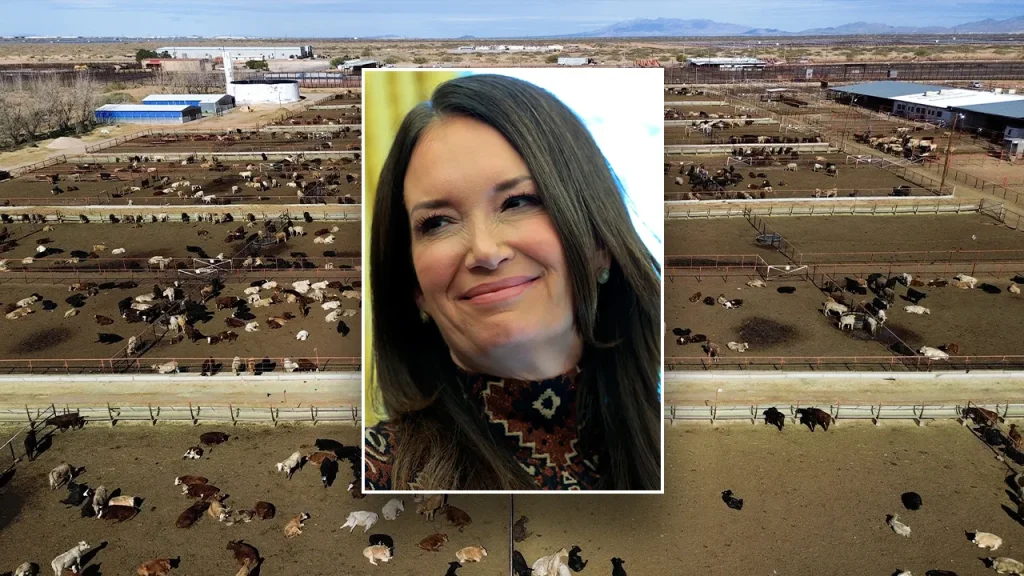In a significant move to safeguard the U.S. cattle industry, Agriculture Secretary Brooke Rollins has issued a stern warning to Mexico regarding the urgent need to address a growing agricultural crisis. This warning follows the alarming spread of the New World screwworm, a pest that poses serious threats to livestock health. Rollins stated that if Mexico does not take effective action by a set deadline, the United States will impose restrictions on the importation of live animals, which could have far-reaching economic implications for both nations.
| Article Subheadings |
|---|
| 1) Urgent Warning Issued by the USDA |
| 2) The Threat of the New World Screwworm |
| 3) Operational Challenges Tied to Mexican Customs |
| 4) Proposed Summit for Cooperation |
| 5) Economic Stakes of Inaction |
Urgent Warning Issued by the USDA
Recently, Agriculture Secretary Brooke Rollins sent a definitive letter to Mexican officials, demanding immediate action against the New World screwworm. This letter was a clear signal that the U.S. would halt imports of live cattle and other animals if Mexico does not address the pressing issue by April 30. The ultimatum was conveyed in recognition of the plight of American ranchers who could face catastrophic losses if the pest spreads unchecked.
Rollins stated unequivocally,
“If these issues are not resolved by Wednesday, April 30, USDA will restrict the importation of animal commodities, which consist of live cattle, bison, and equine originating from or transporting to Mexico.”
This statement underlined the importance of joint efforts to contain a pest that threatens both countries’ agricultural sectors.
The Threat of the New World Screwworm
The New World screwworm is a destructive pest that has been gnawing its way through livestock populations in parts of Central America, now posing a critical threat as it reaches southern Mexico. Known for its potential to decimate entire herds, the screwworm’s larvae feed on the flesh of live animals, leading to severe health issues and even fatalities among livestock.
The USDA has employed a sophisticated strategy known as the sterile insect technique (SIT). This involves aerial releases of sterile flies to disrupt the breeding cycle of the screwworm. However, with the recent escalation of the pest’s spread and logistical challenges faced by Mexican customs, the effectiveness of this method is now at risk.
Operational Challenges Tied to Mexican Customs
A significant complication in combating the screwworm is the operational restrictions imposed by Mexican aviation authorities on the U.S. government-contracted carrier, Dynamic Aviation. According to Rollins, these authorities are limiting operations to six days a week under a temporary permit, hindering the immediate aerial response needed to fight the pest’s advancement.
Moreover, Mexican customs officials have begun imposing high import duties on essential supplies, including sterile flies and aviation parts necessary for the ongoing eradication campaign. Rollins emphasized that these delays, driven by bureaucratic red tape, threaten to cripple the campaign, potentially resulting in financial repercussions not just for American ranchers but also for the U.S. economy at large.
Proposed Summit for Cooperation
In a bid to foster cooperation between the two nations, Rollins has proposed an emergency summit involving U.S. and Mexican government leaders, technical experts, and operational partners. The aim of this summit would be to quickly establish a plan that ensures effective actions are taken to combat the screwworm menace.
Making it clear that collaboration is vital, Rollins has expressed hope that through collective efforts, both governments can pivot from potential trade restrictions to mutual support reinforcing each nation’s agricultural interests.
Economic Stakes of Inaction
The stakes of inaction could not be clearer, according to Rollins. Economic losses for U.S. ranchers could escalate dramatically with each passing day that the screwworm is allowed to gain a stronger foothold. The broader agricultural economy, which is essential for food production and national security, hangs in the balance.
Failure to address this urgent agricultural threat may lead not only to a slowdown in imports from Mexico but could also have a ripple effect across the agricultural supply chain, creating shortages and driving up prices for consumers.
| No. | Key Points |
|---|---|
| 1 | USDA warns Mexico to address the New World screwworm or face import restrictions. |
| 2 | The New World screwworm poses a significant threat to livestock health in both countries. |
| 3 | Operational setbacks have arisen due to Mexican customs and aviation regulations. |
| 4 | An emergency summit has been proposed to enhance cooperation between U.S. and Mexico. |
| 5 | Inaction could lead to considerable economic losses and agricultural supply chain disruptions. |
Summary
The ultimatum issued by Brooke Rollins serves as a stark reminder of the interconnected nature of agriculture between the U.S. and Mexico. The clock is ticking for Mexico to take decisive action against the New World screwworm, which could have dire consequences for the U.S. cattle industry. With the economic stakes increasingly high, both nations must navigate this crisis collaboratively to protect their agricultural interests and ensure food security.
Frequently Asked Questions
Question: What is the New World screwworm?
The New World screwworm is a parasitic fly that lays its eggs in the wounds of livestock, leading to severe infections and potentially death in affected animals.
Question: Why is the USDA threatening to restrict imports from Mexico?
The USDA has threatened to restrict imports due to Mexico’s lack of action against the spread of the New World screwworm, which poses a significant risk to U.S. livestock.
Question: What actions has the USDA requested from Mexico?
The USDA has called for immediate operational changes, including the lifting of customs restrictions on essential materials and the appointment of a senior liaison for expedited communication and cooperation.


